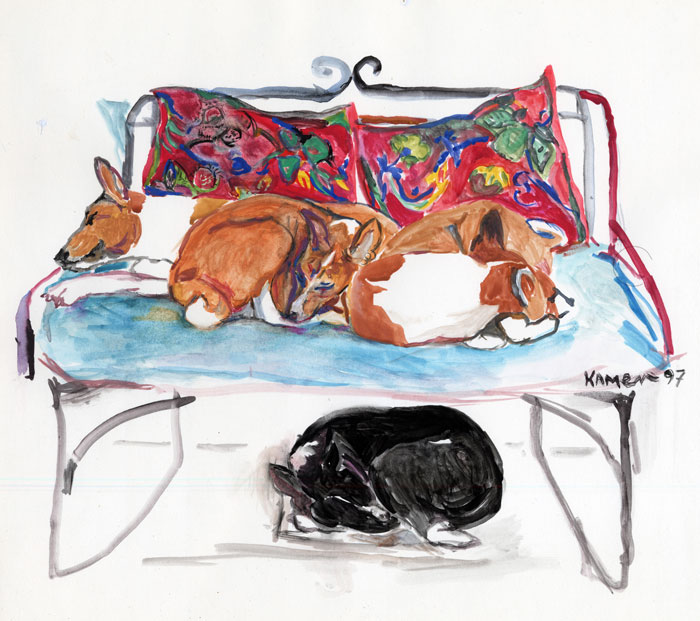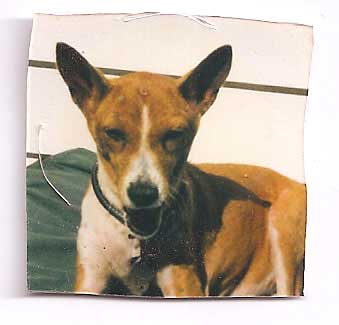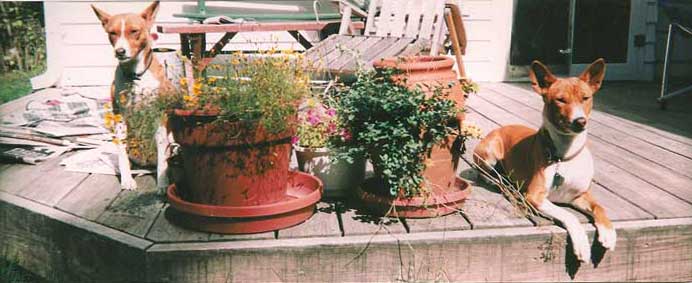Page 12 < previous page > <next page>
Past Maxwells we've won
in 1999
D RE A M E R S


The poster had typography designed by Eunice Ockerman
and raised several thousand $$$ for the BHE.
When I originally entered "Dreamers" in the DWAA contest,
I entered it only in the "Best Poster" category. I soon got a phone call from DWAA,
suggesting I enter it for "Best Illustration" as well. I said, "I'm not an illustrator."
She said, "Never mind that. Just enter it in both." I listened and see how it worked out.
In 2000

An Old Dog's Winter Night
by Debby Mayer
(Published in the Wrinkler in 2000, and originally published in "The Paper" in September, 1999.)
Also reprinted in the Wrinkler, Volume XV, Issue I, February 2011
One evening in the spring of 1999 I had to attend a school board meeting. It was grit-your-teeth boring, but everyone was taking notes, so I got out my notebook and began to write this essay about Bambi (1984–1999). Our literate Dan (1946–2002) titled it, playing off of “An Old Man’s Winter Night,” by Robert Frost.
In that way we kept alive our Bambi—our Bambilina, our Bambito, our Bambitoes, or just Toes (her gang moniker—we were the gang). I’ve read this piece on WAMC, the local NPR station. It’s been published in The Paper, Bark, and the Wrinkler. It won me a Maxwell from the Dog Writers Association of America, for best essay published in a small newspaper. Dan and I attended the awards dinner in New York. He wore his tuxedo. And now Bambi has made it into the 21st century, online! Good dog! She and Cooper (1986–2003) and Dan smile down upon us from the celestial boulevard.

In this photo Bambi (left) and Cooper are relaxing on the deck of our house in Hollowville. Time is fall 1995; Bambi is 11, Cooper is 9. They have read the newspapers and are now taking some sun.
The dog wakes up around midnight, about an hour after we have turned off the light. She stands up next to me on the bed, clambering on top of me if necessary, and shakes herself to wake me.
I get up immediately, untangle her from the blanket and place her on the floor, afraid that otherwise she will break a leg in the middle of the night. She walks to the end of the bed, staggering a little, and then stops, so it is all I can do not to trip over her. I swear at her, but I know she wants to follow the flashlight and me, not lead us.
It is December, or January, or February. The night is black and frigid, and the house is cold with the heat turned down. I am barefoot, afraid that if I pause for slippers she will squat on the dining room rug before I can reach her.
At the sliding glass door that leads from the kitchen to the deck I turn on the outside light, check that the fence gate is latched and open the door. Depending on how cold it is, how wet or how miserable, and how urgent her need is, she walks out onto the deck.
 Bambi Xmas star
Bambi Xmas star
If it is particularly bitter, or snowing, or windy, she pauses in the open door. She may even turn back, so that I have to put my hands on her bony shoulders (this was your idea) and gently shove her out the door. Then she trots out, hunched bravely against the weather, and squats in the snow, or on the ice or the frozen mud.
I stand by the door, watching, freezing, desperately tired. I have not had an uninterrupted night's sleep in a year. I think of Tim O'Brien's Cacciato, on watch in Vietnam, or a professor years ago describing the utter desolation of Army night watch during a Korean winter.
Sometimes the dog gets confused after she pees and wanders farther into the yard instead of coming back. I call her, but she can't hear me, or pretends not to.
I will not go out into the cold in my pajamas, no matter how many stars I might discover. I wait instead, my fury growing.
Sometimes she stumbles getting back onto the low deck or coming through the door frame.
"Good girl, " I say, patting her, and I am surprised at how tender my voice sounds.
Our pack has two other members, one human, one dog, who customarily sleep through our peregrinations. All of this started long ago-two years? More? Then the dog and I got up on my schedule, once, much later, halfway through our sleep. It became our thing.
Now, when I never get into a deep sleep, when her rising and shaking the third time of a night might bring me close to tears, the human will sometimes take her out. The other dog never moves a muscle.
It's not something easily discussed. Put in a dog door, people say. Leave her in the kitchen overnight, spread newspapers, take turns getting up.
But we have been a pack for 11 of her 15 years; it's hard to change.
Some nights I want to snatch her or scream at her or slap her, but I don't. Because the dog, named by the family who first owned her for the baby deer she resembles, has a life story, of course, along with an ineffable sweetness and a sly wit.
I stand at the sliding glass door, actively shivering, fully aware that, childless by choice, I have never sat up with a sick baby, and blessed with good fortune, have elderly parents who are still healthy (today, this week), whom I have never had, yet, to nurse (tomorrow, next week).
And I am also fully aware that something always gets you. For me, this time, it’s a 20-pound basenji with crooked teeth and a sweet smile, with a "good" head but a tail too loose for show.
As the winter wears on, I adapt to our life, Bambi's and mine, some-times lying down at 8 o'clock, or 9 o'clock, and sleeping soundly for an hour, then getting up and continuing what I have to do, paying bills, finish-ing the dishes, at 11 o'clock.
When I realize she is having trouble following my flashlight—I arrive at the sliding glass door to find she has stopped, confused, back in the living room—I figure we are both tired of being polite about this in any case, and I turn on lights as we go.
It never occurs to me that we will not go on like this for another year or two; I spend time trying to figure out how to adapt further to life with her, not without her.
I make these notes on March 22; she dies April 1.
In the days between I have the usual 100 things to do outside of work, but I find myself procrastinating. On a sunny spring Saturday I put the dog beds out on the deck and take photos of her. She does not look healthy in them—thin, with a poor coat.
But she looks happy.
Spring is her favorite season, which is to say the only season she is truly enthusiastic about. In one photo she yawns luxuriantly; in others she connects with the camera in a way she seldom does.
Weeknights I put on music and stretch out on the couch with her, partly out of fatigue, partly because I know she will have her last-chance surgery, recommended by two vets, the following week.
One night I lie on my side, my head on the crook of my arm. Bambi lies alongside me and for the first time ever, she places her head right next to mine on my arm. This is a dog more often polite than friendly; she wants you, on her terms. She likes to sniff you, but runs if you try to sniff her, and turns away in disgust if you kiss the top of her head.
Now we lie side by side, head to head. She doesn’t smell good, but she can’t help it. She wheezes softly. I put my hand on her back leg, wanting to touch her without disturbing her breathing further. We close our eyes. Together, we rest.
Bambi's epitaph reads "Huntress, Gourmand, Wit."
See more from Debby here.
Robert Frost Poem, “An Old Man’s Winter Night”
All out of doors looked darkly in at him
Through the thin frost, almost in separate stars,
That gathers on the pane in empty rooms.
What kept his eyes from giving back the gaze
Was the lamp tilted near them in his hand.
What kept him from remembering what it was
That brought him to that creaking room was age.
He stood with barrels round him -- at a loss.
And having scared the cellar under him
In clomping there, he scared it once again
In clomping off; -- and scared the outer night,
Which has its sounds, familiar, like the roar
Of trees and crack of branches, common things,
But nothing so like beating on a box.
A light he was to no one but himself
Where now he sat, concerned with he knew what,
A quiet light, and then not even that.
He consigned to the moon, such as she was,
So late-arising, to the broken moon
As better than the sun in any case
For such a charge, his snow upon the roof,
His icicles along the wall to keep;
And slept. The log that shifted with a jolt
Once in the stove, disturbed him and he shifted,
And eased his heavy breathing, but still slept.
One aged man -- one man -- can't keep a house,
A farm, a countryside, or if he can,
It's thus he does it of a winter night.
See Debby’s blog: Wednesday, January 12, 2011
Climbing Fences
Dan and I and our two basenjis, Cooper, 16 and Lulu, 2, lived in a rural corner of Claverack, in Columbia County, on a quiet, pretty road that didn’t go anywhere. In two miles there were some 10 houses. Our home was small and modest, but it had almost five acres and the advantage of a private back yard, hidden from view.
During Dan’s brief, terminal illness, I had taken care of him and the dogs and neglected the house. Now the only way to lock the sliding glass door onto the back deck was with a broom sawed off for the purpose, and as I slid the door closed on Cooper and me that icy January morning, I heard the broom handle roll back into place. ………… for more.